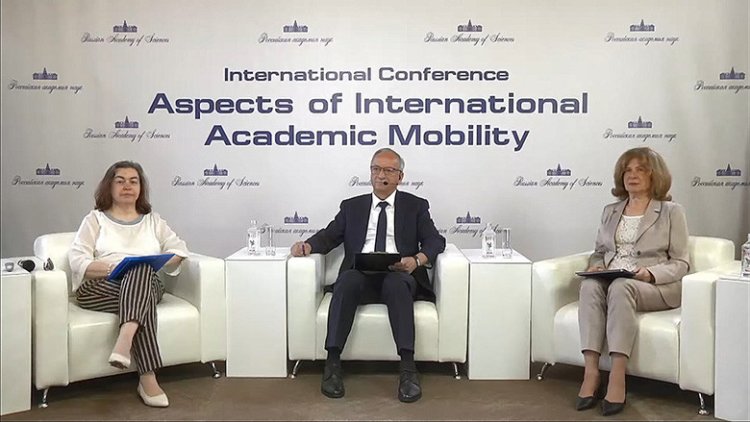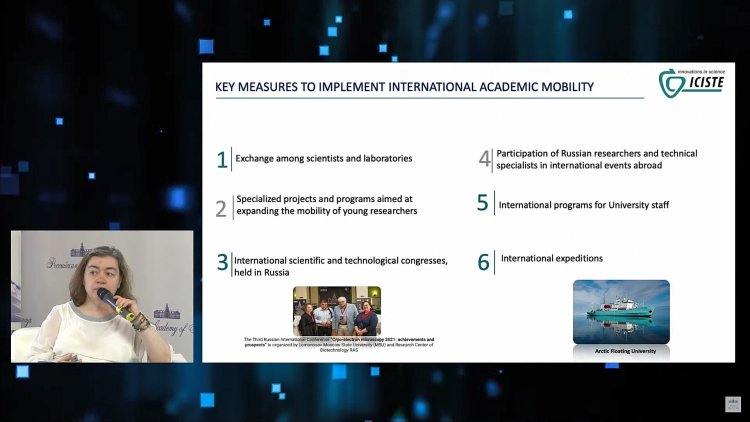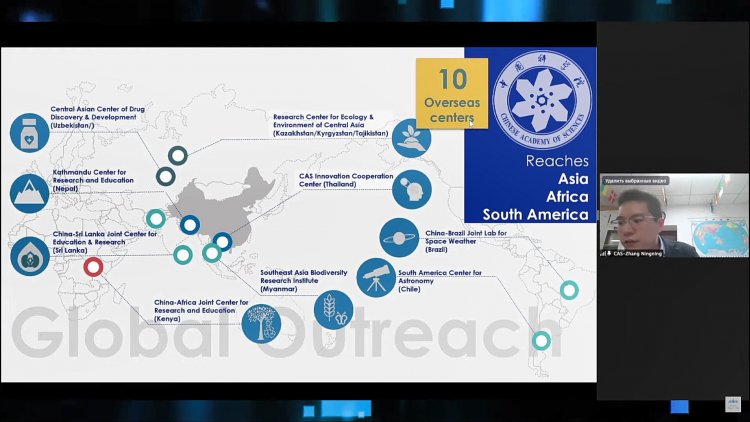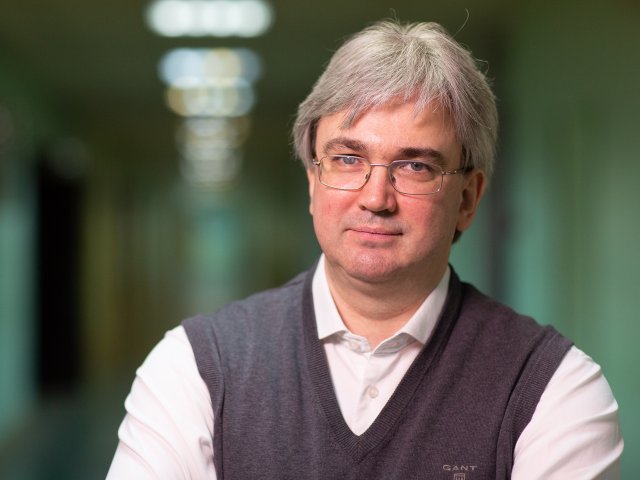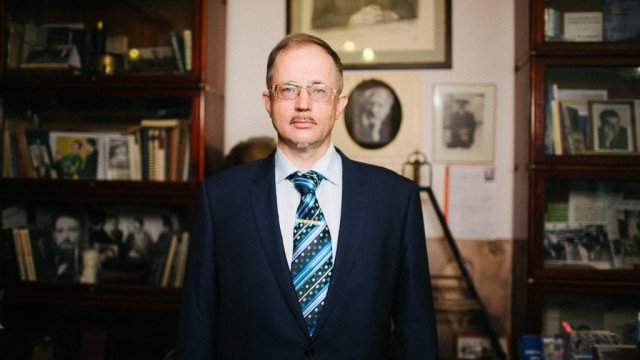Today, on June 16, Aspects of International Academic Mobility, an online conference, took place.
Academy of Sciences and the International Center for Innovations in Science, Technology and Education (ICISTE), jointly with their foreign colleagues, discussed international academic exchange practices, academic mobility programs and problems faced by their organizers, and opportunities for bilateral cooperation in internship programs, expeditions and field studies.
Yuri Balega, Vice-President of the Russian Academy of Sciences, moderated the first part of the conference.
“Now, we are developing an international program for scientific mobility of scientists, so we would appreciate it if participants of the conference could offer some advice on and, to some degree, expert assessment of exchange activities,” Yuri Balega said.
Aleksandr Sergeev, President of the Russian Academy of Sciences spoke at the opening.
“International academic mobility of scientists today is a factor in the development of the common scientific space and internationalization of scientific activities, and a link between countries across the world. The Russian science sector is interested in having joint projects and international scientific conferences and seminars, joint publications and joint grants and prizes, to promote academic mobility,” Aleksandr Sergeev emphasized.
The conference was opened by Irina Kuklina, Executive Director of the International Center for Innovations in Science, Technology and Education, who, by the way, is a member of the team of developers of our academic mobility program.
She pointed out that the world today was facing a huge number of challenges, which could be addressed through cooperation among scientists across the world.
Photo: Freeze frame of the online broadcast from Irina Kuklina’s presentation
During the course of the online meeting, foreign speakers were sharing their experience in maintaining and developing academic mobility of scientists.
Chantal Khan Malek, Research Director, Deputy Director for European Relations of the Europe of Research & International Cooperation Office at National Center for Scientific Research (CNRS) of France, spoke at the conference. She emphasized that the National Center for Scientific Research (CNRS) of France specialized in joint scientific research. Most CNRS employees and researchers are of foreign origin. Over 65% of scientific publications by CNRS were written in collaboration with foreign partners. Such collaboration is on the rise now.
“Russia is a key partner. We have a history of many years of productive cooperation,” Chantal Khan-Malek said.
Doctor Hoeschen, Head of the Moscow Office of the DAAD, Director of the DWIH-Moscow, spoke of policies that determine European academic mobility programs.
The speaker pointed out that the German Academic Exchange Service (DAAD) supported mobility of students and scientists by financing joint projects involving German universities. These activities include: dual diplomas and academic mobility, research grants, scholarships where recipients choose the university and apply.
Alexandra Rosenbach, international programs manager at the Helmholtz Association, spoke about researchers’ mobility as a catalyst for international cooperation, and about policies and programs of the Helmholtz Association.
According to her, the main goal of the organization is to contribute to solutions to problems faced by society, through research and accumulation of knowledge in natural sciences. The international cooperation involves scientists from across the globe.
Zhang Ningning, Deputy Head of the International Cooperation Department of the Chinese Academy of Sciences, gave a brief introduction to the CAS President's International Fellowship Initiative (PIFI), and spoke of the experience with the introduction of this initiative.
He said that the Chinese Academy of Sciences was very focused on international cooperation. For instance, multiple scientific research centers have opened in foreign countries over the last 10 years, providing opportunities for cooperation in many sectors.
The speaker told the participants about PIFI program, which is being implemented all over the world. What makes the program special is that it covers scientists at all stages of their careers in science.
Photo: Freeze frame of the online broadcast from Zhang Ningning’s presentation
Dmitry Mazarchuk, Vice Rector for Scientific and Methodological Work at the Researchers Training Institute of the National Academy of Sciences of Belarus, presented a perspective on the current situation and outlook for interacademy mobility and Russia-Belarus cooperation.
“We have initiated five new scientific councils in five promising areas: nanotechnology and nano-industry, space research, virology, biotechnology and biodiversity, preservation of the national natural assets, investigation of issues in the agricultural sector, and addressing problems through academic work. The Inter-Academy Council for Development of the Union State continues its work as well,” the speaker said.
Gulzhanat Gafu, Adviser to President of the Center for International Programs (Kazakhstan) made her presentation Bolashak-21: New Opportunities.
She sad that this program for specialists was one of the most successful in Kazakhstan. A total of over 14,000 specialists have received training under the program, including 11,000 specialists who are working in Kazakhstan and abroad, contributing to the economy of Kazakhstan.
The program was launched in 1993 with the goal of internalizing education and encouraging academic mobility of young people. The program is financing Master’s degree and post-graduate training as well as professional internships.
Sari Ericsson, Counselor for Higher Education and Science to the Embassy of Finland in the Russian Federation, spoke of some academic mobility issues.
“We are promoting science internationalization in various branches of science, while realizing that it is not enough for the scientific community of Finland. We need to develop and push boundaries. We tried to address the problem, and the number of joint research projects have doubled in the recent years,” the speaker said.
According to Sari Ericsson, there is a lot of scientists working in Finland who are at the start of their careers in science. They come to Finland to do their research. Therefore, a special program was designed to support such activities. The issue under discussion is funding for academic mobility in various countries to enable scientists to use available opportunities.
The academic mobility program will be launched in September. This is an annual program, and researchers use it as a tool to support their research.
Bernhard Plunger, Head of International Relations of the Austrian Academy of Sciences, made the presentation: The Austrian Academy of Sciences: Research for Tomorrow.
He emphasized that the Russian Academy of Sciences and the Austrian Academy of Sciences were quite similar. The foundation for cooperation between them was laid back in the 18th century; the cooperation continues to this day and is of special importance and great interest.
“The cooperation we are establishing is not just bilateral cooperation with partner academies of sciences across the world, but also cooperation with international scientific organizations,” the speaker said.
He focused especially on the Joint Excellence in Science and Humanities (JESH) program and the fact that the terms and conditions of the Austrian program are most attractive to the scientific community. Bernhard Plunger pointed out the current issue of measuring the results of the program, which requires international collaboration.
Carole Mundell, Chief Science Adviser to the British Foreign Office, presented a British view on academic mobility of scientists.
She spoke of how the pandemic changed the format of scientific communication between scientists of various countries. She said that international partners had changed the cooperation mode.
“We have found new ways of communication and unprecedented cooperation with each other,” the speaker said.
According to Carole Mundell, it is important to support talented scientists, including Nobel Prize winners, in getting visas so that mobility can increase.
“Visas would allow inviting young talent so that they can travel the world freely, without restriction,” Carole Mundell added.
Another British mechanism is cooperation with young scientists to support them in choosing their careers, their future and education. Once they have earned a Master’s degree in a British university, they may return to their countries.
Olga Glukhovtseva, Head of the Department of Protocol and Organization of Academic Mobility, a member of the working group for development of the international academic mobility program, presented experience in implementation of academic exchange programs and spoke of new prospects and our draft academic mobility program, which will be presented later this year.
“Research papers in Russia mostly focus on mobility of students and sometimes – faculty members of universities. Scientific organizations should be included as well as the university contingent. In some cases, scientific organizations should be the primary target group,” Olga Glukhovtseva emphasized.
The program will be designed to benefit Russian scientists and foreign researchers interested in cooperation with Russian colleagues. The target group will be MAs, post-graduates, interns, candidates of sciences, research officers and specialists of scientific organizations, and higher education institutions.
Cooperation among scientists will be organized through short- and long-term visits of Russian scientists to other countries for scientific research (with access to unique scientific resources, equipment, unique collections, etc.), participation in expeditions and field studies, joint conferences, symposia and international organizations.
The program is being developed by the Russian Academy of Sciences with involvement of experts from Russian scientific organizations, universities, ministries, and government agencies. The program development team is led by Sergey Malenko, Head of the International Cooperation Department.
During the discussion part of the conference, the participants discussed problems faced by academic mobility program organizers as they interact with the Russian Federation or expand the coverage of their academic mobility programs.
“Incentives for German scientists to go to Russia should be developed. It is important to raise the strategic profile of our cooperation programs and strengthen the outreach of the results. We are doing that by evaluating projects and funding on a regular basis. But this is more about our reporting back to the Government, which provides funds for our programs. We could achieve a great outreach of the scientific community and demonstrate how our programs strengthen the capacity of academic institutions involved. With our Russian partners, we have the Russian-German roadmap which should be sustained. here is a lot of things we could do in the future,” Andreas Hoeschen said.
The speakers also touched on the issue of programs’ duration, funding, and virtual mobility.
According to Bernhard Plunger, any program requires effort to achieve balance between various resources allocated and create conditions for its implementation.
“It is good to move towards a hybrid form of interaction. Virtual cooperation is for meetings, but nothing replaces field missions, expeditions and working together in a lab,” Chantal Khan Malek said.
